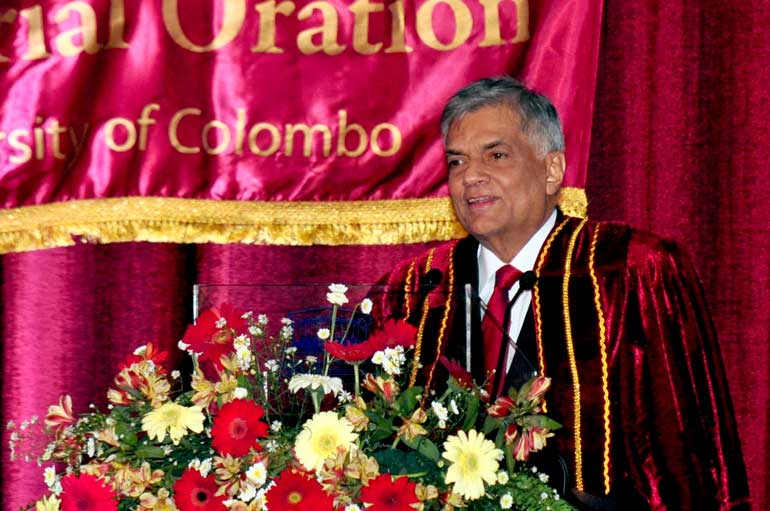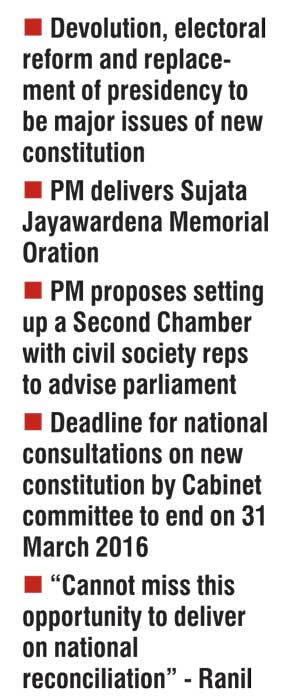Friday Feb 20, 2026
Friday Feb 20, 2026
Saturday, 12 December 2015 00:00 - - {{hitsCtrl.values.hits}}

Prime Minister Ranil Wickremesinghe delivering the Sujata Jayawardena Memorial Oration, organised by the Alumni Association of the University of Colombo at the BMICH yesterday
 By Dharisha Bastians
By Dharisha Bastians
Prime Minister Ranil Wickremesinghe yesterday outlined the broad framework of Sri Lanka’s new constitution that his Government will begin drafting next year, with devolution of power, electoral reform and the replacement of the executive presidential system forming the three main focus areas for drafters of the country’s new supreme law.
Delivering the Sujata Jayawardena Memorial Oration, organised by the Alumni Association of the University of Colombo at the BMICH last evening, Prime Minister Wickremesinghe stressed that consensus on these major issues were the need of the hour.
Explaining how the National Unity Government would go about the process of drafting a new constitution, the country’s first since 1978, Wickremesinghe said that a resolution of Parliament will call for the establishment of a constituent assembly, the proposal of which will then be approved by the Cabinet of Ministers. “The job of the constituent assembly will be to draft the constitution, which will then be put before the people at a referendum,” the Prime Minister said.
A constituent assembly is a body of representatives composed for the purpose of drafting or adopting a new constitution.
He said 31 March 2016 had been set as the deadline on national public consultations on the key facets of the draft constitution, by the cabinet sub-committee tackling the subject.
“Social media will be a major advantage in this consultative process,” the Premier said, adding that the new constitution will be based on the aspirations of the people of Sri Lanka.
Prime Minister Wickremesinghe said that most members of Parliament agree that national reconciliation is a primary concern. “Opposition Leader Mr. Sampanthan and I have discussed the matter, and we are committed to an early political solution,” he explained. Wickremesinghe said President Maithripala Sirisena had also campaigned strongly for national reconciliation to resolve the country’s ethnic problem.
“We cannot, we should not miss this opportunity,” emphasised Wickremesinghe.
He said the new constitution will focus on greater devolution of power to the provinces, within a unitary structure. Wickremesinghe explained that the Austrian model for provincial devolution was useful in this respect. “The impending task before us is to identify additional powers that will be devolved to the centre. It is my belief that these devolved powers should not revert to the centre,” the Prime Minister said. Executive power in devolved subjects should be exercised by provincial ministers, he explained, using the Austrian model.
The Prime Minister said that the cleanup of the electoral system, specifically with regard to the preferential voting system would be integral as the Government undertakes constitution-making.
“A complete return to the first-past-the-post (FPP) system is a non-starter, because no political party will be willing to sign its own death sentence,” the Premier said, explaining that the proportional representation system had allowed small political parties who would never get elected under an FPP system to be represented in Parliament.
Therefore, the Premier said, electoral reform was not just a technical matter, but it pertained to political survival. “Agreement between political parties on election reform will be key to constitution-making,” he explained.
He said electoral patterns had expressed a desire for stability, with only two ruling parties since 1967 losing their majorities during a term of office.
The Prime Minister said the idea of the establishment of a separate constitutional court to deal with matters pertaining to the drafting process and upholding the new constitution was also being discussed. Over the past decade, politicisation of the judiciary had eroded public confidence in the judiciary, said the Prime Minister.
Stressing that no democratic society can thrive on an executive, legislature and judiciary alone, Wickremesinghe said that he was strongly advocating the establishment of a Second Chamber, comprising a-political representatives of civil society. “This Second Chamber will not only advise Parliament but it will also have the power to refer bills back to the House for further consultation,” the Premier said.
“Consensus is the need of the day, prosperity is dependent on stability,” the Premier said, adding that Parliament must meet in harmony, discuss in harmony and depart in harmony.
He proposed the setting up of a mechanism to promote consensus, comprising the Prime Minister, Chief Ministers and political party leaders, similar to that which exists in the European Union.
“The future of this country depends on this constitution-making exercise,” the Prime Minister stressed.